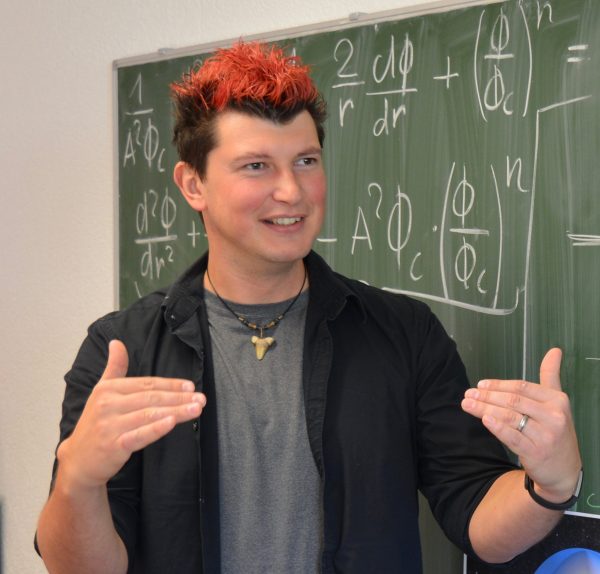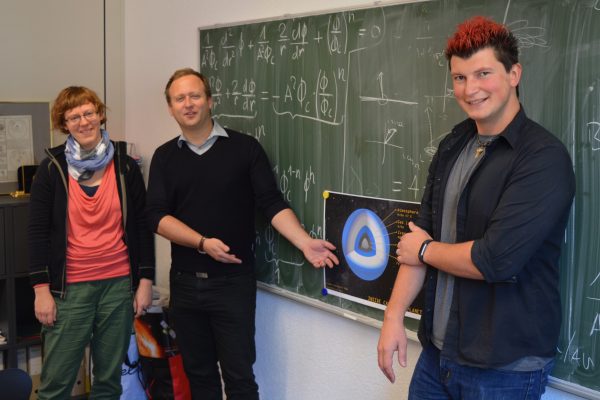«We will find Planet 9 in less than a decade»

With his bright red colored hair Konstantin Batygin looks more like a rock musician than an astrophysicist. In fact, he is both: Assistant Professor of Planetary Sciences at Caltech, US, and leader of the hard rock band “The Seventh Season”. He made headlines worldwide in 2016, when he predicted together with Mike Brown the existence of an undiscovered planet at the edge of the solar system, Planet 9.

Konstantin Batygin, Professor at Caltech, during his visit at the University of Bern in May 2017. (Photo PlanetS)
Based on this work, Christoph Mordasini and Esther Linder at the University of Bern calculated how Planet 9 could look like. «I remember reading your paper and thinking “wow” you are fast – an impressive amount of calculation in such a short time,» Konstantin Batygin told the Swiss researchers when he met them during a visit at the University of Bern in May 2017. «We were already working on a similar topic,» explained Christoph Mordasini: «So, within two weeks we were able to do this study.»
Konstantin Batygin was born in Russia. He moved to Japan with his parents when he was 8 years old. Without knowing one Japanese word, he had to skip second grade being too tall, «not because I was too smart,» he emphasizes. Half a year later he was fluent in Japanese, and the same happened with English when the family moved along to California, 5 years later. Konstantin Batygin is married and has a 5 year old daughter.
PlanetS: At age 30, you are one of the youngest professors in astrophysics. How come?
Konstantin Batygin: I don’t know. I think it is a clerical error. I have never really attributed much attention to age. I also don’t exactly know what it means to be young versus old, I have felt exactly the same way as I feel now ever since I was about 13. So, I haven’t progressed much in my maturity.
You are very confident that Planet 9 exists. When will it be discovered?
We have the search area on the night sky confined to a field of about 20 degrees to 60 degrees. Compared to the full night sky, it is quite small, but simultaneously one has to recall that telescopes don’t have a huge field of view. Planet 9 is so dim – with magnitude 24 right at the edge of being detectable with current technology – that it will take about 20 nights on the Subaru Telescope which is one of the world’s biggest telescopes and very good for this particular search. 20 nights sound doable, but these have to be perfect nights without the moon, without turbulence in the atmosphere to mess up the light. And they have to be more or less between September and January. Who knows, we might find Planet 9 this year, if we get very, very lucky. If not, the search might take up to five years. All in all, I think that we will catch images of Planet 9 on a timescale of less than a decade.

Astrophysicists Esther Linder, Christoph Mordasini and Konstantin Batygin (f.l.t.r.) with an image of the possible inside of Planet 9. (Photo PlanetS)
Who is going to find it?
I don’t know and I don’t have a good prediction which group will be the first to find it. We are of course carrying out our own search for Planet 9. But there are other groups, some using the same telescope, Subaru, as we do. Others are using a telescope called Dark Energy Camera. Some people are using existing data and stack it together to discover Planet 9 in existing images. I think all of these projects have as likely of opportunities to discover Planet 9. So, I would resign maybe 20 % probability to each group.
At the University of Bern, Christoph Mordasini and Esther Linder calculated that Planet 9 could have a temperature of minus 226 degrees Celsius or 47 Kelvin. This means that the planet is much brighter in the mid and far infrared than in the visual. Therefore, they suggest to look for it with a radio or submillimetre telescope instead of an optical telescope. What do you think of this idea?
I think it is a very clever idea. It would be really cool to find Planet 9 through the submillimetre search because if we found it that way, we would immediately learn something about its atmosphere. We would immediately figure out how hot Planet 9 is and that would be extremely valuable.
Besides working as a scientist, you are singing and playing guitar in your rock band. If you had to choose between science and music what would be your choice?
I really enjoy playing music. It’s a big part of my life. I think I enjoy the fact that it is not the way that I pay the bills, because there is absolutely no pressure to make something that sounds good to other people. It is entirely a point of self-expression. In mid/late 2006 we played so many shows, so that I got a taste of what it is like to be a touring musician. It is so hard, so much harder than being a professor. It is physically exhausting. But I see a lot of parallels between the two. The way in which you write music and a new song becomes a presentable object is exactly the same process as the way that a scientific idea becomes a presentable paper. The steps involved go from idea to development to refinement to recording to production. That set of steps is exactly what I do in science as well. So, I am very fortunate to be able to do both. And I would like to continue doing both.
https://www.konstantinbatygin.com
https://www.theseventhseason.net
Categories: External Newsletter, News

